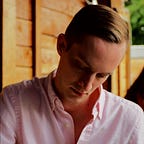The Children of 9/11
How a generation is made
Writers sometimes grasp at tenuous connections where none exist. It’s an addiction for us: taking seemingly disparate events and proving them to be inextricably linked through our own sexy sleuthing.
I’m going to take a risk here and try to link two days, exactly sixteen years apart. One is the beginning of the story, and the other is the end of Part 1. It starts in a living room in western New York — Rochester to be exact — on September 11, 2001.
I’m 22 now, which puts me in first grade when planes flew into the Twin Towers, the Pentagon, and a lonely field in Pennsylvania. Like most six-year-olds, I didn’t have a firm grasp of foreign policy, or the concept of death, so I silently sat in front of the TV with my parents and eight-year-old sister, wondering where exactly in New York City my aunt lived.
Being alive just over half a decade, I hadn’t been a keen observer of the world up until that point, so post-9/11 America is really the only country I have ever known. People my age were shaped by a world awash with words like international terrorism, hijacking, ethnic conflict, insurgency, and body count. These were our dinnertime talking points. Whether or not we went on to work in politics, this is the only world my peers and I have ever known.
An editor of a policy magazine I interned at commented that I seemed more like a writer than a journalist. He went on to say, “Everything is political now, so if you’re a writer, you have to be interested in politics.” Sixteen years after teachers wheeled in TV sets and sent students home early, I found myself in Washington DC, spending my final day of unemployment re-adjusting to a city I’ve always wanted to be a part of. My narrative-attracted mind couldn’t help but enjoy the personal symbolism of starting my first job in politics one day after September 11th.
9/11 pushed us into two wars and jump-started our amorphous and most likely endless “War on Terrorism.” And it created a generation of citizens that can’t escape politics. If I had been born even ten years earlier or later the swell wouldn’t have hit at the moment I was wading into the surf for the first time. But the world and I have grown into something that was never supposed to be. Tomorrow, I’m starting at a political consulting firm. But today, the United States mourns the lives of nearly 3,000 of our citizens stolen from their families.
I took a trip to France this past August, and over those two and half weeks, I had a running argument with my friend about the futility of getting involved in politics. He couldn’t understand why I want to work in a field he believes it is impossible to do true good in. “Everything has unintended consequences,” was his favorite line. He’s training to be a doctor because there is much less gray area about what good is in medicine than in politics. No matter how much wine we both had, I couldn’t convince him that politics was worth his time. I didn’t entirely convince myself either, but I know I want to be here, and do this work, and I always have. Because this is my way of preventing another generation from growing up in the same world I did. Sixteen years isn’t long enough to hide this connection.
